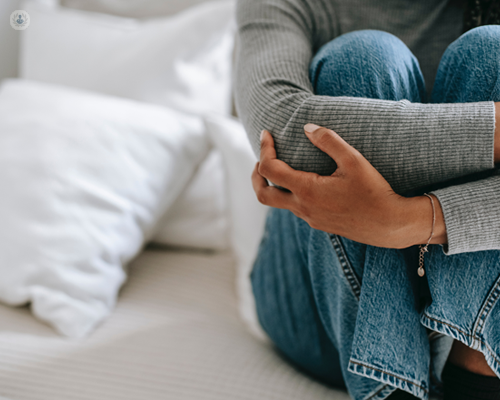Good to know: All about Menopause
Written in association with:Here to answer questions you may already have asked about menopause, but require a reminder - or those you just might not have even thought to ask - are leading experts from London Gynaecology clinic including general practitioner and advanced menopause specialist Dr Claire Phipps.
Credit - Dr Claire Phipps, GP and Advanced Menopause Specialist at London Gynaecology
Credit – Laura Southern, nutritional therapist at London Gynaecology
Credit – Mr Tomasz Lukaszewski, senior consultant in reproductive medicine at London Gynaecology and IVI London

What age does menopause start?
The average age of menopause is 51 years, with the menopause meaning the day in which you can retrospectively determine that you have been without a period for 12 consecutive months. After this day, you are post-menopausal. Most women will have their last period between 47 and 53 years of age. This can be different for you depending on your ethnicity and genetics. Perimenopause is the transition to your last period and beyond and can start in your early 40’s but no two women are the same.
What causes the menopause?
The menopause refers to one day in time when your periods have stopped for 12 consecutive months. Before this you are perimenopausal and after post-menopausal. The menopause is caused by the natural decline in production of oestrogen and progesterone from the ovaries. This marks the end of a woman’s reproductive stage. The ovaries (and the eggs within) produce oestrogen which is one of the hormones which drives the natural reproductive cycle in women. As the number of eggs declines with age, so too does the production of oestrgeon, before the ovaries stop producing it and women reach the menopause.
How is menopause diagnosed?
Women over the age of 45, who have any symptoms of the perimenopause do not need any blood tests to diagnose the menopause. This is because at this age and beyond it is highly likely that the natural decline in oestrogen has started to occur. Prior to this age, and certainly in younger women, doctors may carry out some hormone blood tests and other blood profiles to rule in or out the menopause. This is because in some women, menopause can occur earlier, and for these women it is important to clarify the cause, in order to provide the most appropriate treatment.
What are common symptoms of menopause, why do they happen and can you treat them?
Perimenopause is the transitional period leading up to menopause, during which a woman's body undergoes hormonal changes that eventually result in the cessation of periods. This phase can last for several years and is characterised by a variety of symptoms, both physical and emotional. Around 80% of women will experience some degree of symptoms, and whilst some will not be severe, 25% of women will have significant symptoms. There are many different symptoms, and no two women will experience the symptoms in the same way. Some symptoms include:
- Irregular periods: Menstrual cycles may become irregular in length and flow due to fluctuations in hormone levels, particularly oestrogen and progesterone.
- Hot flushes and night sweats: These sudden feelings of warmth, often accompanied by flushing of the face and upper body, can disrupt sleep and cause discomfort.
- Sleep disturbances: Changes in hormone levels can lead to insomnia, difficulty staying asleep, or waking up frequently during the night.
- Vaginal dryness: Decreased oestrogen levels can result in vaginal dryness, itching, and discomfort during intercourse, along with recurrent urine infection, burning and bleeding after intercourse.
- Mental health / psychological symptoms: Hormonal fluctuations can affect neurotransmitters in the brain, leading to mood swings, irritability, anxiety, or depression.
- Changes in libido: Some women may experience a decrease in sexual desire or changes in sexual function during perimenopause.
- Fatigue: Hormonal changes, disrupted sleep, and other symptoms can contribute to feelings of tiredness and fatigue.
- Weight gain: Changes in hormone levels and metabolism can make it easier to gain weight, especially around the abdomen.
- Memory problems and difficulty concentrating: Some women may experience cognitive changes such as forgetfulness, difficulty concentrating, or "brain fog" during perimenopause.
- Muscle and joint pains.
- Dry eyes and dry skin
These symptoms occur because of the gradual decline in ovarian function and hormone production that characterises the perimenopause. Oestrogen is a master regulator of many processes in a woman’s body, and as the levels decline or fluctuate as they do (unpredictably), various physiological processes are affected, leading to physical, psychological and genitourinary symptoms.
An individualised approach is necessary in managing symptoms of menopause, with a variety of treatment choices available. Treatment options would usually depend on the symptoms. Options include hormonal pharmaceutical treatment such as Hormone replacement therapy (HRT), which is the mainstay of management and helps to provide long term health protection. Hormone replacement therapy is the gold standard treatment for managing most symptoms of the menopause.
For women who choose not to use HRT or cannot use HRT, there are other treatments available which can help with individual symptoms of the menopause. These include antidepressant medications, herbal remedies, acupuncture, cognitive behavioural therapy for example. As ever, an individualised and holistic approach is key.
Lifestyle changes can also help many of the symptoms of the perimenopause.
- Eating a balanced, varied and healthy diet which can help keep the body weight down and not put so much pressure on the joints. Focus also on improving your gut health which can often suffer in the menopause – eating fermented foods (if you can tolerate them) helps with this.
- Exercise such as resistance training and aerobics to help with joint stiffness and promote healthy bones and muscles. An increase of blood flow to the brain can help with brain function. Movement can also increase the levels of our ‘happy’ hormones – dopamine and serotonin and make us feel better.
- Reduce stress levels with relaxation and mindfulness. Yoga, massages and breathing exercises help with tension in the neck, back and shoulders as well as reducing anxiety and irritability.
Vaginal dryness
Vaginal dryness is really common. The vaginal lining is dependent on oestrogen and with declining ovarian function and reduced levels of oestrogen the vaginal glands stop producing mucus fluid and lubrication. As a result, the vaginal lining becomes dryer and much more delicate. This can lead to discomfort during sex and also occasional bleeding or discharge, soreness, burning, itching, recurrent thrush, recurrent urine infections and reduced clitoral sensation.
Vaginal dryness responds well to vaginal oestrogen treatment. This is not hormone replacement therapy and can be used alongside HRT or on its own. The dose is very low but the results can be lifechanging. Depending on your symptoms, and the severity of these, vaginal oestrogen can be used as creams, gels or pessaries.
Lack of libido
Lack of libido can be a common symptom in the perimenopause and post menopause as our ovaries produce less testosterone. This can reduce sexual desire. If you are experiencing these symptoms, HRT can often help, but if severe, seeing your doctor is important as testosterone replacement might help alongside HRT. If there is any unusual bleeding or discharge, it is important to seek urgent medical attention to rule out any other pathology.
How long does the menopause last?
The menopause is one day in time as explained above.
What is Hormone Replacement Therapy (HRT) and when does someone need it?
To support the body through menopause, many women choose hormone replacement therapy (HRT) which replaces the hormones that the ovaries were producing so that the symptoms and effects of menopause are minimised.
In addition to reversing symptoms of menopause and improving quality of life, HRT also helps with the prevention of osteoporosis (thinning of bones) and cardiovascular events such as heart attacks.
The two main hormones in HRT are oestrogen and progestogen. HRT involves either taking both of these hormones (combined HRT) or, in the case of women who have had a hysterectomy, just taking oestrogen (oestrogen-only HRT).
HRT should always be started after a careful assessment of risks and benefits
Alternatives to HRT
If you would like to avoid taking conventional HRT, some lifestyle changes will help. A balanced diet with an appropriate amount of protein, calcium and foods containing phytoestrogens (plant sources of oestrogen) can help. Common foods containing phytoestrogens are soya, nuts, lentils, chickpeas and oily seeds. Stopping smoking and reducing alcohol consumption is also beneficial. Exercise, particularly aerobic and weight bearing exercise, is good for the bones and reduces the risk of osteoporosis. Vitamin D is important for the bones and checking and maintaining optimum levels reduces the risk of osteoporosis.
Can periods restart after menopause?
Once you have reached the menopause (i.e. 12 consecutive months without a period), you should not have any further periods. If any bleeding does occur, it is advised that you speak to your doctor and report this.
Can you still get pregnant and have a baby if you have begun menopause?
Women who are perimenopausal are still very much fertile so will need to consider contraception in this phase.
Can you have fertility treatment after menopause?
Fertility treatment after menopause is generally not possible using a woman's own eggs, as menopause marks the end of a woman's ovarian reserve. However, in some cases, women who have undergone menopause may still be able to conceive using assisted reproductive technologies such as IVF with egg donation.
Egg donation involves using eggs from a younger woman and fertilizing them with either partner’s or donor’s sperm. The resulting embryos are then transferred to the uterus of the woman who is wishing to conceive. This method allows postmenopausal women to carry a pregnancy to term and experience childbirth.
Before IVF treatment with egg donation can be offered postmenopausal women will require a thorough medical assessment to ensure that there are no general health contraindications to pregnancy
Credit - Mr Tomasz Lukaszewski, senior consultant in reproductive medicine at London Gynaecology and IVI London
What are the best supplements to take for menopause?
With supplements there is no 'one best' as each woman is individual and it also depends whether they're taking HRT or not. There are certain areas that many women might want to focus on - this includes bone support - so vitamin D, calcium and magnesium can be supportive. Stress support for many women can also be useful - a good B complex, magnesium perhaps and some ashwagandha too.
Credit – Laura Southern, nutritional therapist at London Gynaecology
What are the best vitamins for menopause?
Again, it’s very individual - definitely vitamin D if levels are low. Get a blood test from the GP and check levels of B12, iron, vitamin D as these should all be supported if low.
Credit – Laura Southern, nutritional therapist at London Gynaecology
Can magnesium help with menopause symptoms?
Yes, magnesium can be really supportive when suffering with menopause symptoms. It can help reduce muscle cramps and restless legs, it can also support sleep and help reduce anxiety. I often recommend a magnesium supplement to my clients. Choose magnesium glycinate or threonate for sleep and anxiety symptoms. Magnesium citrate is best used to support digestion and magnesium oxide can often promote loose stools so can be supportive for constipation.
Credit – Laura Southern, nutritional therapist at London Gynaecology
If you’re looking for gold-standard menopause treatment, arrange a consultation with Dr Phipps via her Top Doctors profile.


